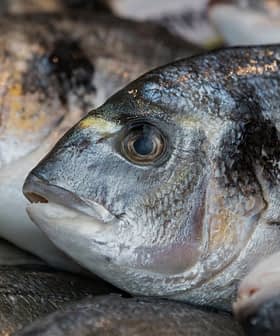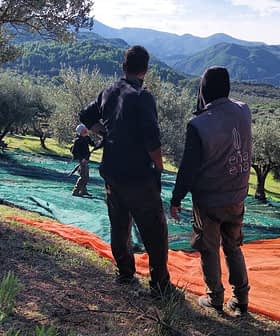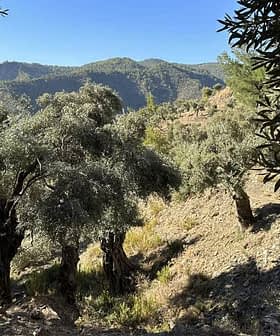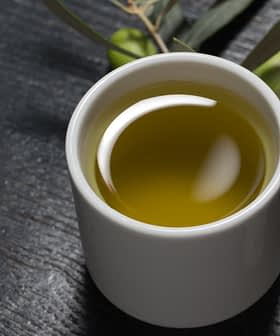IOC Leader Focuses on Expanding Cultivation, Fighting Climate Change
The International Olive Council director, Jaime Lillo, says the future of olive oil production lies beyond the Mediterranean.
 IOC executive director Jaime Lillo (center)
IOC executive director Jaime Lillo (center) Jaime Lillo López, executive director of the International Olive Council, emphasizes the importance of addressing climate change in the olive oil industry and highlights the positive impact of olive farming on the environment. The IOC is expanding its reach beyond the Mediterranean basin to include more countries and experts to collaborate on addressing challenges related to olive oil production and climate change.
“Climate change is the major challenge we face ahead,” Jaime Lillo López, executive director of the International Olive Council (IOC), told Olive Oil Times.
“I have requested the support of the IOC’s members to start a permanent working line on this matter,” said Lillo, who served as deputy executive director for more than seven years and took the helm of the organization on January 1st.
By diversifying regions of production., we are also diversifying the risk of the impact that extreme climate events have on overall production.
Established in 1959 with the International Olive Oil Agreement and under the auspices of the United Nations, the International Olive Council brings together the olive oil and table olive production sectors. Currently, 19 countries from four continents are IOC members.
During a conversation with Olive Oil Times, Lillo underlined how several steps must be taken to cope with increasingly unpredictable weather conditions.
See Also:Role of Women in Sector Takes Center Stage at World Olive Day“We need to facilitate the adaptation of production. The olive tree is a very resilient living organism,” Lillo said.
“For example, olive trees are growing on the edge of the desert, and others have lived for thousands of years,” he added. “They can survive in extreme conditions, given that they need less water or nutrients than other crops. However, we need to understand better the relation of the different genetic varieties of olive trees with the changing environment.”
The IOC executive director underscored how olive farming actively contributes to mitigating the impact of agriculture on the environment.
“There is a role for olive cultivation within the strategy to combat climate change,” Lillo said. “Not everybody is aware that behind olive oil or table olives, there are more than 11 million hectares of olive trees, forming a kind of manmade forest that removes 4.5 tons of carbon dioxide per hectare from the atmosphere on a yearly basis.”
“We have estimated that the production of one liter of olive oil has a positive carbon balance, reducing more than 10 kilograms of carbon dioxide from the atmosphere,” he added. “Not only is this fact quite unique, but it is also considerably unknown.”
“We are working to facilitate the right methodology for estimating the carbon balance at the farm level to encourage better practices and to facilitate good communication and recognition, including access to the voluntary market of carbon credits,” Lillo explained.
According to Lillo, the IOC’s long-standing commitment to standardization and research drives the growth in olive oil production outside the olive tree’s cradle, the Mediterranean basin.
“In my opinion, this trend will consolidate and is indeed great news for the future of olive oil,” Lillo said. “There is a need for more olive oil, and quality olive oil in particular. If we take the last crop years, we observe that there is not enough olive oil to respond to the growing global demand.”
“We are already witnessing the impact of climate change on olive oil production. Particularly in the Mediterranean region, we have observed a tendency toward less rainfall and higher temperatures,” he added.
According to IOC’s figures, global olive oil production in the 2022/23 crop year reached 2.57 million tons and 2.41 million are expected for 2023/24. Global production exceeded the three million ton threshold between 2017/18 and 2021/22.
“By diversifying regions of production, we are also diversifying the risk of the impact that extreme climate events have on overall production,” Lillo said.
Lillo sees global cooperation among producing countries and stakeholders as crucial to the sector’s development.
“I do not see a conflict or competition between the Mediterranean and other regions. On the contrary, what I see is complementarity and synergy,” Lillo said. “Proof of this is the increase in the number of laboratories and tasting panels recognized by the IOC, both in the Mediterranean and non-Mediterranean regions.”
In its efforts to expand the footprint of the IOC beyond the Mediterranean basin, Lillo said the organization will host its first Southern Hemisphere editions of the Mario Solinas Quality Awards in Uruguay in 2024.
“By diversifying regions of production, we have different harvest calendars, flavors and other specificities that come to enrich the categories of olive oil,” Lillo said.
“At the moment, not only is global demand growing faster than production, but we should also not forget that olive oil represents about two percent of the global consumption of vegetable oils,” he added. “This means there is still room for growth, and all producing regions are welcome.”
While olive oil consumption in many regions might depend on the prices of the product, the shortage of olive oil is unevenly affecting consumption trends.
“It is an obvious fact that the consumption of olive oil is limited by the availability of olive oil produced every crop year,” Lillo said.
“We see consumption more affected in traditional producer countries where olive oil consumption is high, around 10 kilograms per capita,” he added. “In those Mediterranean countries, olive oil is a product consumed on a daily basis, making it more sensitive to price changes.”
“Overall, consumption is moving from the traditional Mediterranean region to other regions, such as the United States, Brazil, Japan, Canada, Australia or China,” Lillo continued.
He said that interest in olive oil is increasing as people learn more about the health benefits and seek more sustainable ways to eat and live.
“We need to feed this process with the abundant scientific evidence we have in this regard, making it easier for new consumers to discover the product,” Lillo said. “Once you try a good olive oil, you simply don’t want to give it up.”
“The growing interest in living healthier is also coupled with a greater concern regarding sustainability and climate change,” he added. “Olive oil and table olives are in a privileged position when it comes to these matters, on top of the fact that they are delicious.”
In recent years, the number of IOC member states has grown. According to Lillo, such a trend underscores the critical role the organization is playing in supporting the development of the sector on a global level.
“I believe this enlargement will continue, as there are numerous advantages for countries developing their olive sector or protecting the rights of their olive oil consumers,” Lillo said.
He believes that one of the main reasons states join the IOC is to access the organization’s expertise in olive cultivation, table olive and olive oil production.
“We have the most knowledgeable experts coming from all over the world to discuss the main challenges and opportunities regarding genetics, cultivation practices, standards, quality, sustainability, climate change, health, economics or marketing, just to mention a few of our many areas of work,” Lillo said.
“This knowledge exchange happens formally during meetings or seminars, but there also exists a substantial network of experts in permanent communication,” he added. “Hence, the IOC represents a prime opportunity for all producing regions to be connected to this vast and valuable pool of knowledge.”
Lillo emphasized that cooperation among olive-growing and non-olive-growing countries is essential to respond to challenges posed by climate change.
“This is how we face current challenges at the IOC: we facilitate the ongoing collaboration between the best experts from different parts of the world across all specialized fields,” he said.
“As an example, I can refer to the international workshop organized last year on how the olive sector can contribute to the solution against climate change, “ he added. “On this occasion, the IOC welcomed 300 expert participants from 30 countries.”
According to Lillo, the broad reach of activities entices stakeholders and institutions beyond the Mediterranean basin.
“Some countries have traditionally not paid enough attention to how to defend the rights of their olive oil consumers,” Lillo said. “However, it is in their interest to ensure a positive experience every time their consumers open a bottle of olive oil, regardless of its origin.”
“When we look at the standards for olive oil, one of our core activities, the IOC works continuously in the revision of parameters and methods of analysis,” he added. “We believe that participating actively in this scientific work is highly interesting, and we always invite interested countries to participate.”
Lillo said the value provided by the IOC to all of its members has been enhanced by the accession of non-Mediterranean countries, such as Argentina and Uruguay in 2017, along with the more recent editions of Georgia in 2019, Uzbekistan in 2021 and Saudi Arabia in 2023.
“There are also other countries currently in the process of accession, such as Bosnia and Herzegovina and Azerbaijan,” Lillo said. “Other countries that have shown interest in the IOC are participating as observers, as is the case of Brazil, Peru or the United States.”
Share this article









